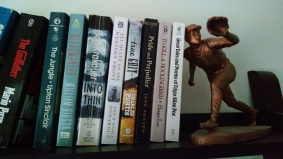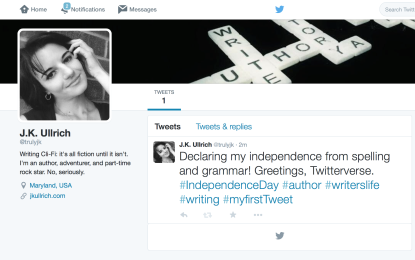J.K. Ullrich's Blog, page 28
July 13, 2015
Review of Blue Karma on GirlPlusBook
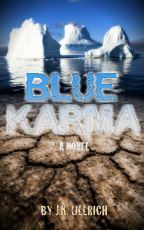 Sarah (@sarahplusbook) just posted her review of Blue Karma on the awesome GirlPlusBook YA book review blog. Thanks, Sarah! Maybe I’m a flash nerd, but I got a huge kick out of the drop-down window with the quote from Amaya. It makes my story feel like a really cool video game or something. I smiled to see Blue Karma recommended for “tom-boys, tree climbers, adventure seekers, and backyard-campers” because I have answered (or still do) to all of these descriptions. Check out the review and the myriad other diversions on GirlPlusBook (Shark Week reads, anyone?).
Sarah (@sarahplusbook) just posted her review of Blue Karma on the awesome GirlPlusBook YA book review blog. Thanks, Sarah! Maybe I’m a flash nerd, but I got a huge kick out of the drop-down window with the quote from Amaya. It makes my story feel like a really cool video game or something. I smiled to see Blue Karma recommended for “tom-boys, tree climbers, adventure seekers, and backyard-campers” because I have answered (or still do) to all of these descriptions. Check out the review and the myriad other diversions on GirlPlusBook (Shark Week reads, anyone?).

July 10, 2015
JK’s Summer 2015 Backyard Biodiversity Challenge (and yes, there are prizes)
 The imminent sixth extinction has made a lot of headlines recently. For most of us, “extinction” is something that only happens to dinosaurs, or maybe exotic animals from nature programs: pandas or polar bears, not creatures of our own experience. Caught up in our daily traffic, it’s easy to forget how many species live right alongside us, and are just as vulnerable. I grew up in the temperate mid-Atlantic, where bumblebees were a key fixture on the backyard wildlife roster: only yesterday a story appeared in the news wires about the range of these fuzzy pollinators are losing range because of climate change. Biodiversity—a major theme of my upcoming novel, The Darksider—is something we don’t always appreciate.
The imminent sixth extinction has made a lot of headlines recently. For most of us, “extinction” is something that only happens to dinosaurs, or maybe exotic animals from nature programs: pandas or polar bears, not creatures of our own experience. Caught up in our daily traffic, it’s easy to forget how many species live right alongside us, and are just as vulnerable. I grew up in the temperate mid-Atlantic, where bumblebees were a key fixture on the backyard wildlife roster: only yesterday a story appeared in the news wires about the range of these fuzzy pollinators are losing range because of climate change. Biodiversity—a major theme of my upcoming novel, The Darksider—is something we don’t always appreciate.
Therefore (cue the heralds) I am announcing a Backyard Biodiversity Challenge!
 All you need to participate is a cell phone camera…and maybe a little magnification. I’ve been passionate about photography since childhood (thanks to my mom, a lifelong hobbyist) and even snagged a college minor in the art, so when someone showed me a clip-on macro lens for my cell phone a few weeks ago, I had to get one of my own and try it out. While it can’t rival my DSLR, it’s a surprisingly competent little gadget that turns my phone into a back-pocket microscope. Definitely worth $18 on Amazon! Playing with my new toy has reacquainted me with the incredible wealth of tiny life forms in my neighborhood.
All you need to participate is a cell phone camera…and maybe a little magnification. I’ve been passionate about photography since childhood (thanks to my mom, a lifelong hobbyist) and even snagged a college minor in the art, so when someone showed me a clip-on macro lens for my cell phone a few weeks ago, I had to get one of my own and try it out. While it can’t rival my DSLR, it’s a surprisingly competent little gadget that turns my phone into a back-pocket microscope. Definitely worth $18 on Amazon! Playing with my new toy has reacquainted me with the incredible wealth of tiny life forms in my neighborhood.
All the pictures here I took along my favorite running trail with nothing but a cell phone macro lens and some patience.
 The ability to see and document these tiny wonders with my little pocket lens has literally changed my perspective. We discount the vibrance of our own local biomes because we don’t stop to notice the many humble species thriving at the fringe of human civilization. But how breathtaking is it to see the dusty scales on a butterfly’s wing, or a spiderweb jeweled with dew, or the colors in the throat of a flower? This is as high def as it gets. Last month my Laddie and I watched an ant and a caterpillar get in a fight (it was an insectoid sidewalk smackdown, and it was hilarious). Instead of missing nature’s syndicated series of the spectacular, let’s try to get it on film.
The ability to see and document these tiny wonders with my little pocket lens has literally changed my perspective. We discount the vibrance of our own local biomes because we don’t stop to notice the many humble species thriving at the fringe of human civilization. But how breathtaking is it to see the dusty scales on a butterfly’s wing, or a spiderweb jeweled with dew, or the colors in the throat of a flower? This is as high def as it gets. Last month my Laddie and I watched an ant and a caterpillar get in a fight (it was an insectoid sidewalk smackdown, and it was hilarious). Instead of missing nature’s syndicated series of the spectacular, let’s try to get it on film.
Almost everyone has a cell phone these days. Take yours—macro equipped or not—outside and see what species you discover in your own community. Research your finds online and try to identify them. Send your best pics to me (jkullrich at gmail dot com) and I’ll feature some of them on my blog. After the autumnal equinox (September 23) I’ll pick the most outstanding submissions for the following prizes:
Top three (3) backyard biodiversity champions will win ebook copies of my upcoming book The Darksider when it publishes.
Grand prize winner will receive an e-book copy of The Darksider AND the opportunity to name a character in book two of the trilogy.
You’re never too old to go exploring—I’m 29, and I’ve had a blast photographing insects and plants—so if you like science fiction stories and want an excuse to play with your cell phone this summer, step up and show me what you’ve got!
It dismays me that science sparks so much division in our society today. It doesn’t matter whether you believe in deity-assisted development or the subtle shift of genetics: everyone can admire the marvelous, delicate complexity of these tiny creatures sharing our backyards. If anything, science should be the thing that unites us. We all inhabit the same Earth and—for now, at least—it’s the only planet we’ve got.

July 9, 2015
Guest post on SolaFide Publishing Blog
In case you missed the article I wrote a few weeks ago on marketing techniques for indie authors, it’s been featured as a guest post on the blog of SolaFide Publishing, a self-publishing consulting company that offers many services to independent authors. With options for perfecting your manuscript and my tips on shameless self-promotion of your work, this is a one-stop shop for getting your book out there and getting it noticed!

July 8, 2015
Top 5 Wednesday – Things on my bookshelf that aren’t books
This week’s Top 5 Wednesday topic made me realize I really need to dust my bookshelves. Here are a few non-literary items I discovered between sneezes:
Speakers and a Beep
What happens when two bibliophiles move in together? Shelf space becomes prime real estate. I sacrificed my CD collection (yeah, I still had a CD player; I’m a 90s child, okay?) to free up shelf space for our combined libraries, but I missed having music from “real” speakers, not just tinny laptop sound. So for Christmas my Laddie got me this wondrous little contraption called a Beep that links to our Spotify account and blasts any song my dancing feet fancy. I love music. Almost minored in it at university, but it didn’t fit with the journalism theme. I rarely write without an appropriate soundtrack!
 Seashells
Seashells
Because I’ve been obsessed with the ocean—with water in general, but especially the ocean—for as long as I can remember. You did read the premise of my novel, right?
Race medals
If I had as many awards for writing as I do finisher’s medals, race coins, and cute plexiglass plaques, I’d be writing my Pulitzer prize acceptance speech right now instead of a blog post.
Running isn’t our only sport—my Laddie and I are also huge baseball nerds. (And of course our teams are rivals, because love is just weird like that.) Instead of proper bookends, our paperbacks lean against a Hall of Famer statue, a framed commemorative baseball card, a jersey-clad garden gnome…and yes, we own several baseball history books as well.
Family photos
It’s motivating to look at the smiling faces of people you love and think “damn…I’ll have to dedicate a book to each of them.” I’d better get writing!
Top 5 Wednesday is the creation of Lainey over at Goodreads. Check out the group and join the other “Wednesday-ers“!

How to make an indie author squeal like a kid at Christmas
Maybe I’m still an over-exciteable new author, but yesterday this made my evening:
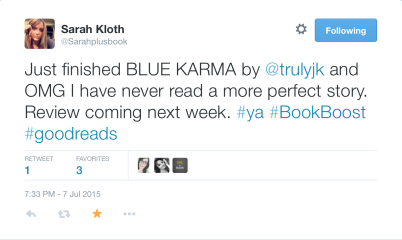 Going public with one’s work can make any writer anxious, but I think indie authors especially so, because we don’t have a publishing company to support us. We stake everything–our self-esteem, our reputations, our chances of getting a conventional book deal in the future–on reader’s opinions. (I won’t even start on that inconvenient artistic impulse to write a good story that people will enjoy.) The tweet from @Sarahplusbook made me glow inside. While I consider myself far from “perfect”, as a writer or as anything else, it’s incredibly gratifying to hear my book elicit such a strong, positive reaction from a reader.
Going public with one’s work can make any writer anxious, but I think indie authors especially so, because we don’t have a publishing company to support us. We stake everything–our self-esteem, our reputations, our chances of getting a conventional book deal in the future–on reader’s opinions. (I won’t even start on that inconvenient artistic impulse to write a good story that people will enjoy.) The tweet from @Sarahplusbook made me glow inside. While I consider myself far from “perfect”, as a writer or as anything else, it’s incredibly gratifying to hear my book elicit such a strong, positive reaction from a reader.
I don’t think any indie author gets into publishing because they expect to make their fortune (although that would not be an unwelcome outcome, heh). We do it because the stories clamoring in our heads demand a voice, and because we want to share the joy we feel in those stories with others. When someone like Sarah finds such satisfaction in my tale she wants to shout it out to her friends, all the uncertainty of self-publishing dissolves for a little while. It gives me hope that no matter what the commercial success of Blue Karma, it’s doing exactly what I intended: entertaining readers and giving them a little something to think about!

July 7, 2015
Review of “Blue Karma” on Reading7Mandy
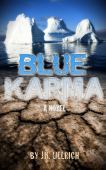 I recently sent a promo copy of Blue Karma to YA connoisseur Mandy at her book blog Reading7Mandy, and she just posted her review. It’s interesting to get the perspective of a native Californian, as much of the story takes place there! Check out Mandy’s comments on my book and many others.
I recently sent a promo copy of Blue Karma to YA connoisseur Mandy at her book blog Reading7Mandy, and she just posted her review. It’s interesting to get the perspective of a native Californian, as much of the story takes place there! Check out Mandy’s comments on my book and many others.

July 6, 2015
Recent Reads: Saving the World One Word at a Time: Writing Cli-Fi
I received a promotional copy of this book from Ellen Szabo in exchange for my honest review: thanks, Ellen!
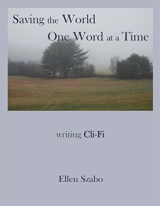 In the preface to this book, author Ellen Szabo writes “I wish someone had told me when I was young that separation of the `hard sciences’ and `creative arts’ was a false duality”. I can certainly relate! As a cli-fi author myself, I know the two disciplines can be powerful allies. I’m glad Szabo’s book will help make this emergent genre more approachable for aspiring writers. “Saving the World One Word at a Time: Writing Cli-Fi” is a useful workbook for writers who want to explore the cli-fi genre, but need a little nudge to get started. Szabo discusses cli-fi as a form of social activism and highlights ways to bring environmental speculation to life. Some of the techniques she includes are ones I used myself in Blue Karma, such as using familiar, everyday things to tether the cli-fi world to readers’ own experiences, and considering how one’s chosen apocalypse affect society’s established power structures. Based on my own writing experience, I felt Szabo was astute in the topics she chose to include. Most of the book’s 55 pages are devoted to writing prompts and exercises, which will help newcomers to the genre find inspiration and begin crafting their stories. I would have liked to see Szabo give examples from existing cli-fi novels to illustrate her points. This also would have added another dimension to the book, expanding it into a seminal study of a new genre. I’m a little disappointed this angle wasn’t included–I would’ve loved to hear Szabo’s perspectives on some popular cli-fi stories–but as an introductory manual to writing cli-fi, the book is admirably concise and covers all the main points. I hope this book will eventually make its way into creative writing courses and help dispel the antiquated notion that speculative fiction (so often snubbed in university English departments) cannot carry important literary and social themes.
In the preface to this book, author Ellen Szabo writes “I wish someone had told me when I was young that separation of the `hard sciences’ and `creative arts’ was a false duality”. I can certainly relate! As a cli-fi author myself, I know the two disciplines can be powerful allies. I’m glad Szabo’s book will help make this emergent genre more approachable for aspiring writers. “Saving the World One Word at a Time: Writing Cli-Fi” is a useful workbook for writers who want to explore the cli-fi genre, but need a little nudge to get started. Szabo discusses cli-fi as a form of social activism and highlights ways to bring environmental speculation to life. Some of the techniques she includes are ones I used myself in Blue Karma, such as using familiar, everyday things to tether the cli-fi world to readers’ own experiences, and considering how one’s chosen apocalypse affect society’s established power structures. Based on my own writing experience, I felt Szabo was astute in the topics she chose to include. Most of the book’s 55 pages are devoted to writing prompts and exercises, which will help newcomers to the genre find inspiration and begin crafting their stories. I would have liked to see Szabo give examples from existing cli-fi novels to illustrate her points. This also would have added another dimension to the book, expanding it into a seminal study of a new genre. I’m a little disappointed this angle wasn’t included–I would’ve loved to hear Szabo’s perspectives on some popular cli-fi stories–but as an introductory manual to writing cli-fi, the book is admirably concise and covers all the main points. I hope this book will eventually make its way into creative writing courses and help dispel the antiquated notion that speculative fiction (so often snubbed in university English departments) cannot carry important literary and social themes.

July 4, 2015
Independence Day
Today I accepted the necessity of social media for indie authors and joined Twitter:
I’m now steaming live from @trulyjk. I love this handle: it indicates I’ll be tweeting candid thoughts as I experience things, and teases the fact that I am truly “just kidding” about a lot of things! It will be a nice complement to this blog, freeing me to communicate more spontaneously and connect with many more fantastic readers. Restricting myself to 140 characters will be a challenge, given my adamant refusal to abbreviate words except under the most dire circumstances, but hey, I like word games. Just think of it as contemporary haiku….Follow me @trulyjk and let’s see what adventures we can share!

July 3, 2015
Recent Reads: Hyperion
Reading Hyperion recalled my years in an undergraduate English department: the words mesmerized me, some of the ideas enthralled me…and the suffocating pretension tempted me to switch majors (or novels, in this case). I could tell the author was an English major even before confirming my suspicions on Wikipedia. We can always sense one another’s presence! I could also tell it would be an exceptionally literary science fiction novel right from the beginning, when the setup presented characters staring stories on a pilgrimage across the mysterious planet Hyperion. A sci-fi twist on The Canterbury Tales, I thought. That’s clever. Unfortunately it also makes the story rather disjointed.
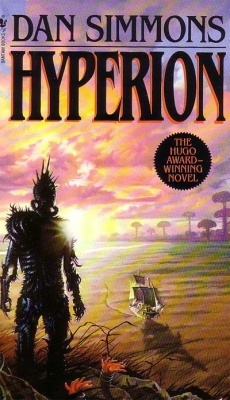
Each of the pilgrim’s tales is a complete novella in its own right. Several would’ve made great full-length novels. But this approach precludes the reader from gaining any sort of momentum in the book, or observing subtle developments in the characters. Instead each player effectively removes their mask as they explain what brought them to Hyperion to seek the violent semi-supernatural entity called the Shrike. (I thought the Shrike, by the way, was one of Simmons’ more captivating creations; he should’ve spent more time with that, although perhaps that’s addressed in the series’ next book). The tales aren’t a bad literary device, but they make the scant pages of pilgrimage linking them feel like an afterthought.
The Priest’s tale, told in epistolary form, reads like the sort of eerie sci-fi short one might find in a Locus anthology. The Scholar’s tale tries to mix F. Scott Fitzgerald with questions of Old Testament faith. Both character’s stories are heavily laden with biblical themes. Indeed, religious motifs permeate the entire book. This would’ve been more interesting if it didn’t compete with the book’s other main theme of stuffing the maximum amount of literary references into one novel (seriously, everything from Beowulf to The Wizard of Oz. Even my trained English major brain could hardly keep up.)
All I got out of the Soldier’s tale was that human beings get off on violence. Literally. The story makes sexuality and war inextricable. Perhaps there’s some subtextual irony in this parallel of procreative and destructive acts. Does a fighter’s keen awareness of physical vulnerability prompt celebration of mortal flesh? Are we drawn to domination, whether in the battlefield or the bedroom? Does the “death” euphemism of orgasm found in many cultures mirror the thrill and horror of bloodlust—“dying” at the moment we feel most alive? Wow, man, that’s deep.
The Poet’s tale kept me laughing out loud, because the narrator lambasted—in delightfully articulate phrases—just the sort of literary pretension that lurks elsewhere in the novel. Some of his quips about writing, creativity, and the publishing world should hang over every writer’s desk. One of my particular favorites: “Belief in one’s identity as a poet or writer prior to the acid test of publication is as naive and harmless as the youthful belief in one’s immortality… and the inevitable disillusionment is just as painful.”

“Sheath thy hell-whip, good sir space knight! Let us farcast outside the Hegemony before the Core senses our presence in yon Web!” Excessive sci-fi jargon can be more obtuse than Old English.
The Detective’s tale pays clear homage to Raymond Chandler, with a cyberpunk spin worthy of William Gibson. Both are authors I admire, so this was an awesome combination. The story also involves the 19th century poet John Keats and sneaks in references to Sherlock Holmes. For the most part I really liked this story, except for a few details I can’t discuss without spoilers.
The Consul’s tale plods along until the end, when it tries to cram all the political complexity of Frank Herbert’s Dune into a few summarizing pages. Those final paragraphs would’ve made a great story; it disappointed me that Simmons devoted most of this novella to repetitive flashbacks rather than exploring the colonial rebellion he skimmed over with a few casual reminiscences.
Each standalone tale was generally enjoyable, and all were extremely well-written. The pilgrimage strung these disparate revelations together and linked them to the larger scheme about to unfold. Hyperion is essentially the prologue to its companion novels, relying on extended analepsis for backstory. One thing that plagued me throughout the book, however, was Simmons’ addiction to jargon. He obviously enjoyed creating worlds, technologies, histories, and cultures. The problem is that 1) he rarely bothers to explain any of them, just rattles them off in dense paragraphs of invented terminology, and 2) most of them aren’t really germane to the story. They are atmospherics.
Nothing weighs down a book like endless references to made-up things that seem to have no direct relevance to the plot. It brought to mind a quip from Futurama, when the character Mom states that antennae “make [robots] look more science fiction-y.” I felt like Simmons indulged the same impulse. The glut of jargon gives his universe a futuristic gloss, but doesn’t contribute much substance. I found it distracted me from the story and became almost annoying at times. Admittedly, part of this may be my own preferences as an author: I like tight plotlines that move quickly. I don’t like dawdling on the cutting-room floor of my imagination, trying to include all the cool stuff I thought up that doesn’t really fit into the story.
This overwhelming indulgence of imagination, combined with the countless literary references, makes Hyperion feel a bit bloated. Even the series name—The Hyperion Cantos—harkens to pretentious poetry. The book is like a 500-page discourse with that smug literature professor who lectured about Meta-Textual Significance and Underlying Mythos, the one who smirked when you raised your hand in class and made you feel like you missed some obvious meaning in the work. Does my academic background in English leave me better prepared to read a novel like this? Or is it a disadvantage, making me hypersensitive to the story’s many layers and sending me on an obsessive-compulsive scavenger hunt for symbology? Perhaps an English degree is like the Priest’s alien cruciform: a symbiotic consciousness that, although occasionally unwelcome, can never be excised.
I can’t say I didn’t enjoy the book, but I was never able to lose myself in it, either. Although Hyperion concluded with many questions unresolved and the true story just beginning, I don’t know whether I’ll read the rest of the quartet. Simmons didn’t create enough attachment to the characters or the universe to make me snatch up the sequel immediately. But as the pilgrims are lured to the planet Hyperion, my curiosity about the tantalizing concepts yet unexplored—the Time Tombs, the Shrike, the Ousters—may pull me again into the story’s gravity.

July 1, 2015
My next book!
To all of you in the blogosphere who’ve suffered weeks of shameless teasers, and to people close to me who’ve endured a month of indecision and unedited draft chapters, I’m pleased to introduce…my next novel.
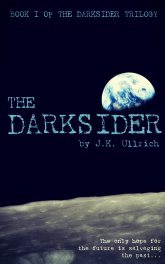 Or should I say, my next three novels?
Or should I say, my next three novels?
Yes, the reason I hesitated about tackling this project is because it’s a trilogy. Committing to three books is considerably more onerous than committing to one. But my “writey sense” is tingling, telling me it’s the right time for this story. (Recent news turned the hourglass on this project, much as the drought crises last year finally goaded me into finishing Blue Karma; nothing motivates like the threat of your cool futuristic story idea becoming non-fiction.)
The Darksider features cli-fi themes, but explores them in a more classic science fiction context. I’m already into the third chapter and have a solid map for the rest. Improved planning–one of the innumerable lessons I learned from writing Blue Karma–will hopefully expedite the drafting process. With lots of hard work and some luck, this baby could be in your Christmas stockings, but more likely it will arrive early next year. I’m excited to delve into a new story and share it with you as it unfolds. Check out the synopsis of The Darksider and let me know what you think in the comments!



